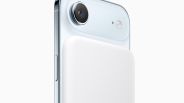Articles by James Maynard
Marine Shells' Optical Structures Inspire Ideas For Transparent Displays
Limpet shells could lead to new technologies, potentially revolutionizing electronic displays. How do the shellfish create these dazzling light shows?
Scientists Comes Up With Solution To Black Hole Collision Equation
Rotating black holes in binary systems are challenging to model, but now new equations could help uncover some mysteries of the early Universe.
Researchers Come Up With Solution To Early Universe Mystery
Matter fills the Universe, while antimatter is unseen, except in laboratories. Now, cosmologists may know why this is the case.
Coral Disease Killing Off Reefs, Scientists Blame Warming Atlantic
Elkhorn and staghorn corals are now threatened by white-band disease, and a new study concludes global warming may be adding to the problem.
Google Artificial Intelligence Masters Video Games
Computers are now able to play classic video games at least as well as the best human players. What could this mean for the future of artificial intelligence?
These Are The Foods That Cause Addictions
The most addicting foods have been identified, and they are exactly the ones one might suspect. The most addictive foods in the world have been identified in a new study, although many of the selections are not surprising.
Three Austrian Men Get First Bionic Hand Reconstruction
Bionic hands are now implanted in three men from Austria. How do they work? Three men in Austria have each been implanted with the world's first bionic hands.
Majority Of US Is Pro-Vaccine
Most Americans support mandatory vaccinations, a new study reveals. What could this mean for upcoming elections?
Corals In Great Barrier Reef Are Eating Plastic, Raising Concerns
Microplastics in the ocean are being consumed by corals in the Great Barrier Reef, but what impact could this pollution have on marine ecosystems?
These Foods Are Most Prone To Being Sources Of Illnesses, US Government Reports
Food-borne illnesses are spread through a variety of crops and meats. Which are the most dangerous to human health?
Apparently Rats Didn't Cause Black Death: It Was The Gerbils
Gerbils, and not black rats, may have spread the black death from Asia to Europe, new research reveals.
Amur Leopard, World's Rarest Big Cat, May Be Making A Comeback
Amur leopards are the rarest big cat in the world, but their numbers have doubled in just eight years, World Wildlife Foundation officials reported.
Relax In The Sauna, You May Extend Your Life And Improve Your Heart Health
Saunas may confer great health benefits - and longer lives to those people who visit the facilities. How much of a difference can they make?
Pen Draws Actual Circuits Using Carbon Nanotube Ink
Nantube fibers can be applied to any surface using a simple pen. How could this change the future of electronics?
Brain Uses WW2 Code-Cracking Stats To Make Decisions
Rhesus monkeys use the same tool as World War Two code breakers to make decisions, a new study reveals. What does this mean for study of the human brain?
Oysters And Clams Getting Hit Hard By Ocean Acidification
Ocean acidification is becoming more of a problem over time, but how does agriculture add to the problem?
WHO Single-Use Smart Syringes Could Save A Million Lives
Smart syringes could save over a million lives a year, a new report from the World Health Organization states.
Lawsuit Threat Looms Over Superbug-Contaminated Endoscope Maker As UCLA Patient Fights For Survival
Carbapenem-resistant Enterobacteriaceae (CRE) is a superbug now responsible for two deaths in Los Angeles. What happened?
Remembering Malcolm X On 50th Anniversary Of His Assassination
Malcolm X was assassinated 50 years ago. Here's a look at the life and times of the controversial African-American leader.
Want To Live A Happy And Healthy Life? Live In Alaska. No, Really
Alaska residents are enjoying the highest well-being compared to all other states. Is your state in the top 10 when it comes to happiness?
Injectable Hydrogel Could Be Best Form Of Drug Delivery
A new hydrogel could deliver drugs over the course of months, potentially revolutionizing treatment for heart disease, cancer and other conditions. The hydrogel can carry one or two drugs per dose.
Venus And Mars Tango In Moonlit Sky: Here's How You Can Watch
Venus and Mars will be seen close together in the sky this weekend. Here is how to view the planetary conjunction.
Hubble Photo Of Beta Pictoris Offers Insight On Birth Of Planets
Beta Pictoris is a star in the process of forming planets and stars, but what previously-unseen phenomenon did Hubble see there?
NASCAR Stressing Importance Of STEM Education
NASCAR and Scholastic have teamed up to support education with a new series of lessons with a Nascar theme. What can teachers and students expect?
NASA Delays Spacewalk Due To Suit Problem
Spacesuits could be present problems, possibly endangering astronauts, NASA warns. What happened? Spacewalks scheduled for travelers aboard the International Space Station (ISS) have been delayed, due to possible problems with a spacesuit.
Researchers Discover Antibody To Neutralize Dengue
Dengue fever could soon be treated by a newly-identified antibody. How serious is this disease, and why have treatments been so hard to develop?
Too Much Soda Consumption May Be Cancer Risk
Soda could cause cancer, according to a new study from Consumer Reports. How much danger are Americans facing from the beverages?
New York City Climate Change Panel Predicts Doom And Gloom By 2100: Hotter, Wetter And Underwater
Climate change could bring dangerous conditions to New York City, a new report concludes. Just how bad could things get?
Scientists Identify DNA That Makes Human Brains Grow Bigger
Brains grow in the presence of human snippets of DNA. What could this mean for the study of evolution?
Ants Have Better Toilet Manners Than You Think
Black garden ants design their nests with bathrooms, new research reveals - but why? Ants built toilets in their nests and use the lavatories instead of randomly dropping waste, new research has discovered.




